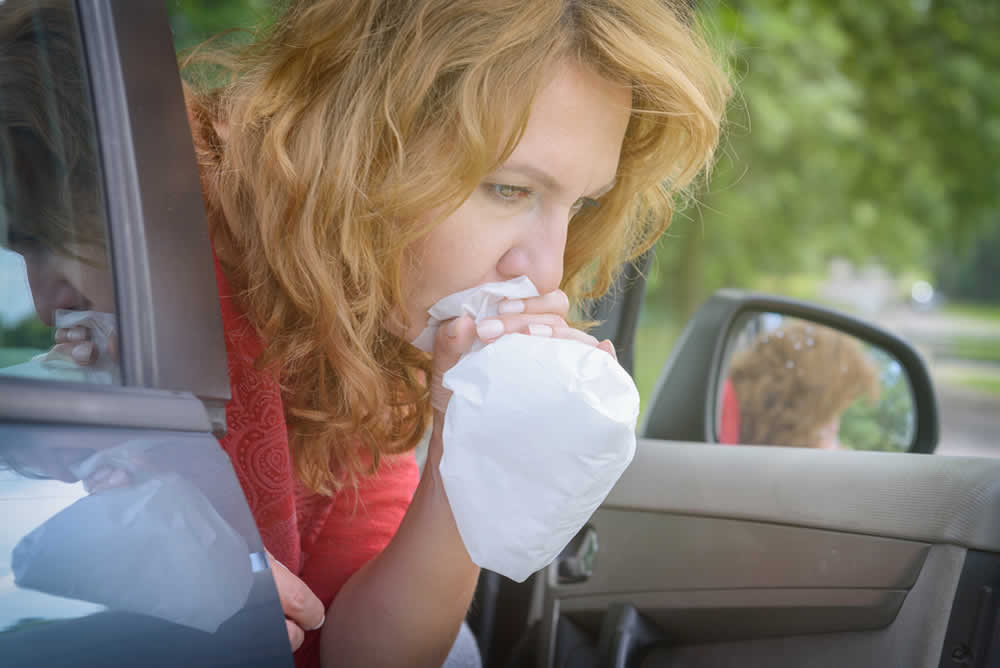
You’ve packed the caravan, mapped out the route, and everyone’s excited to hit the road. But you’ve barely made it to the end of the street before the inevitable happens: someone in the car starts feeling queasy. Whether it’s one of the kids in the back or an adult in the front seat, travel sickness can quickly take the shine off any caravan adventure.
Also known as motion sickness or car sickness, this common travel complaint affects more people than you might think. Let’s look at what causes it, how to manage it, and how to keep your caravan holidays enjoyable for everyone – without the sick bags.
What are the symptoms of travel sickness?
Besides the classic nausea and vomiting, those suffering from motion sickness may also experience:
- dizziness or light-headedness;
- cold sweats;
- pale or clammy skin;
- excessive saliva or a watering mouth.
These symptoms can begin quickly and escalate, especially on winding roads, stop-start traffic, or hot days with poor airflow in the vehicle.
What causes caravan travel sickness?
The NHS explains that motion sickness is caused when the balance-sensing parts of the body – particularly the inner ear – send different signals to the brain than what the eyes are seeing. This sensory mismatch confuses the brain and triggers feelings of nausea.
For example, when you’re seated in a moving caravan and focusing on a book or screen, your eyes tell your brain you’re still, while your body feels movement – hence, the queasiness.
Tips for preventing motion sickness on the road
The good news is, there are lots of practical steps you can take to reduce the likelihood of motion sickness when travelling by caravan. Try the following:
- sit strategically – the front passenger seat usually experiences less motion, making it ideal for those prone to nausea (not suitable for small children under UK car seat laws;
- keep your eyes on the horizon – focusing on a fixed point outside helps re-sync your body’s balance cues;
- let in fresh air – open a window slightly or use the vehicle’s air vents to help with airflow;
- take slow, deep breaths – breathing exercises can calm the nervous system and reduce symptoms;
- plan regular breaks – stopping every hour or so for fresh air and a short walk can help reset the senses;
- avoid heavy meals before setting off – a light, plain snack is better than greasy or spicy food before travel;
- keep distractions ready – singing, listening to audiobooks, or gentle conversation can help distract from discomfort, especially for children.
Natural and over-the-counter remedies
If lifestyle changes aren’t enough, there are a few options worth exploring:
- acupressure wristbands – these have a small knob or button on the inside which presses on the Pericardium 6 or Nei Guan point in your wrist, and you may try the sensation for yourself by taking your three middle fingers and pressing them down on the inside of your wrist, when your index finger will then locate the P6 spot;
- root ginger – which you can chew on or eat in a biscuit, drink in an infusion of tea or take as a tablet or capsule. Again, the science behind using this – a centuries-old remedy for settling upset stomachs – is inconclusive, but seems to work for many people;
- drugs – there are any number of over-the-counter remedies found in your local chemists.
Before your caravan trip: test what works
Travel sickness isn’t life-threatening, but it can be miserable. It can also turn a dream caravan holiday into a bit of a nightmare if not planned for in advance. So, a few weeks before your next trip:
- try out any wristbands, ginger remedies, or medications on shorter car journeys;
- identify which seating positions work best for your family;
- practice calming breathing techniques with kids;
- get used to packing a mini “sickness kit”.
What to pack for managing travel sickness
Here’s a handy travel checklist to keep everyone more comfortable:
- ginger chews or tea;
- acupressure wristbands;
- over-the-counter travel tablets (age-appropriate);
- wet wipes and antibacterial hand gel;
- mints;
- bottled water and light snacks;
- resealable plastic bags (for emergencies);
- a change of clothes, just in case.
Final thoughts
Travel sickness can strike at any age and during any caravan journey – but with a bit of forward planning, you can keep it under control. Whether you’re heading to the coast or the countryside, taking regular breaks, packing smart, and finding the right remedy will help everyone arrive feeling refreshed and ready to enjoy the adventure.
For more helpful caravan travel advice, including safety tips, travel planning, and caravan insurance information, check out our free guides and resources section.

